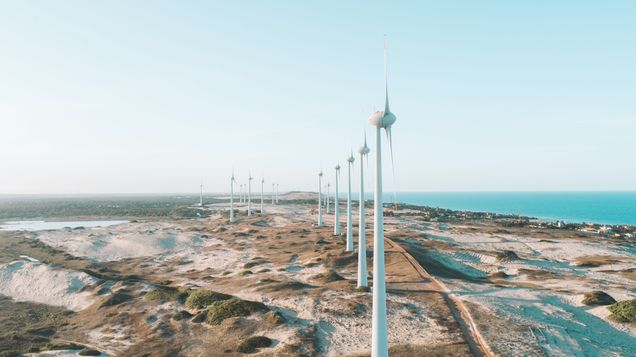Webinar Summary – Political Economies of Energy Transition: Wind and Solar Power in Brazil and South Africa

By Luma Ramos
The recent Intergovernmental Panel on Climate Change report stressed that greenhouse gas (GHG) emissions from 2010-2019 were higher than in any previous decade, and as such, limiting global warming will require major transitions in the energy sector. However, little is known about how low-carbon energy transitions unfold, particularly in developing countries.
On May 19, the Boston University Global Development Policy Center hosted the last webinar of its Spring 2022 Global Economic Governance Book Talk Series. During the webinar discussion, Kathryn Hochstetler, Professor and Head of the Department of International Development at the London School of Economics and Political Science, discussed insights from her new book, Political Economies of Energy Transition: Wind and Solar Power in Brazil and South Africa.
Through a political economy lens, Hochstetler’s book explores how interests and policy coalitions explain different results in renewable energy transitions. To guide her work, she compared the implementation of wind and solar power in Brazil and South Africa.
Her analytical thesis is that decisions about energy transitions respond to four different constellations of interests and institutions: climate change, industrial policy, distribution and consumption and location. Each of these has its own inherent dynamic that brings together advocates and dissidents. The four dimensions may also not push in the same direction, nor are they necessarily moving at the same pace. As a result, it is necessary to understand each of these political economies and how they interact with one another, either facilitating or undermining energy transition policies. The book’s Brazilian and South African analyses took these parameters into consideration.
Hochstetler highlighted the Brazilian wind sector case as a success. As the national electricity structure relies on non-fossil fuel sources, the climate debate is a bureaucratic and measured response, led by government entities acting within their existing regulatory spaces and using standard operating procedures. Furthermore, a long history of industrial policy and an active role of the Brazilian Development Bank have driven the expansion of the local wind supply chain. As a result, Brazil has seen a positive green spiral process, where the government collaborated with and created an industrial coalition with aligned interests. So far, the local wind industry has created more than 100,000 jobs.
Conversely, the Brazilian solar industry had a different outcome, or a ‘delay story’, where the local solar supplier industry hasn’t developed at the same pace as in the wind industry. Hochstetler stressed the high initial costs as a restraint factor to a greater solar industrial expansion, with local manufacturing creating approximately 10,000 jobs.
For South Africa, its energy transition represents other challenges from other political economies. Most notably, the country has strong actors defending the use of fossil fuels—i.e., Eskom, workers in utilities sector and activists, leading to a more politicized energy transition debate. The African country has a coal-dominated electricity structure, and Eskom, South Africa’s largest state-owned enterprise and energy producer, as well as its allies, have pushed a disruptive, politicized transition process. This political economy features Eskom and renewable firms in opposing coalitions, leading to a lack of consensus and lackluster wind and solar development.
Additionally, South Africa’s social structure and racial inequality have presented other significant challenges. The country’s electricity service has a long history of inequality that did not recognize Black Africans as citizens and did not offer them provisioning services. In this scenario, recent attempts to increase energy demand by expanding it to millions without access have failed, precisely due to a lack of resources to pay for this service. Meanwhile, wealthy citizens who already have access are increasingly using distributed solar as an alternative. Hochstetler argued that without addressing how racial and social inequalities are built into the South African political economy and electricity infrastructure, the country would not be able to have a successful renewable energy transition.
Ultimately, energy transitions depend on the intersection of these four political economies, and Brazil and South Africa represent just two possible trajectories. Brazil is characterized by a more bureaucratic approach, offering positive and more straightforward outcomes. In contrast, South Africa’s is highly politicized, where powerful fossil fuel enterprises became a combative coalition stymying renewable energy programs.
Hochstetler’s analytical approach shines light on how disparate national energy transitions will be over the next several decades. A better understanding of how varying political economies impact energy outcomes will be key to successfully reaching resilient net-zero economies around the world.
*
Never miss an update: Subscribe to the Global Economic Governance Newsletter